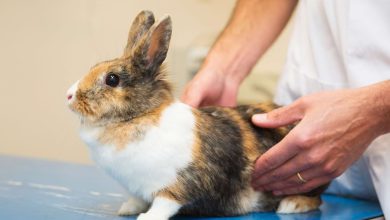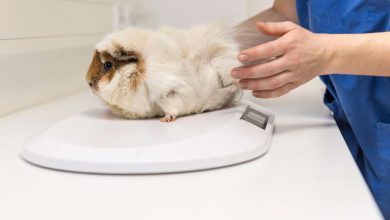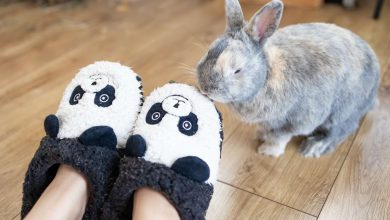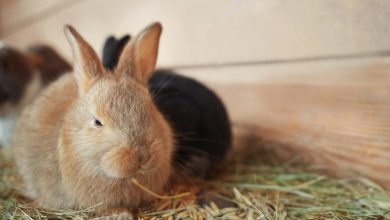Baby Guinea Pig Care: How to Care for Young Guinea Pigs
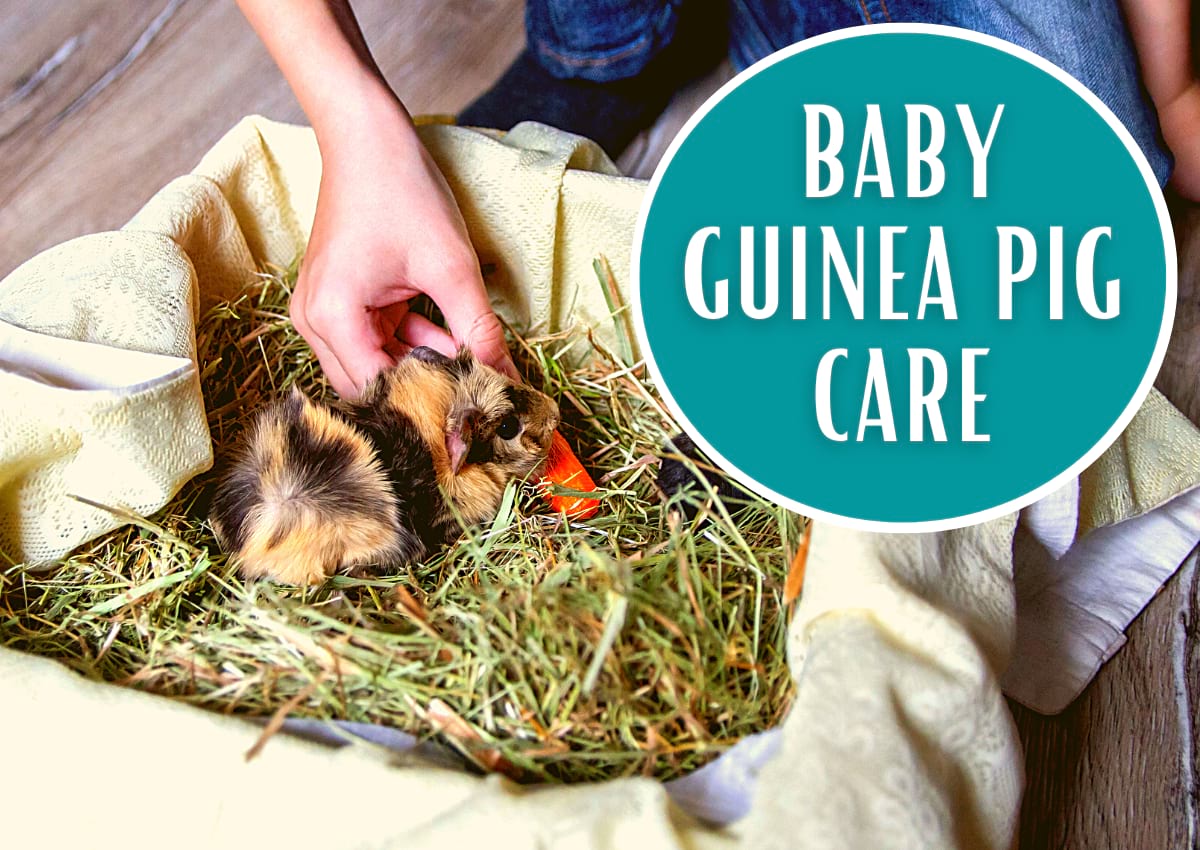
Is your guinea pig pregnant? There’s a lot to consider when it comes to caring for young guinea pigs.
Baby guinea pigs need a warm enclosure, vet care, constant access to fresh hay, and small amounts of daily pellets and vegetables. Their mothers typically care for them so long as you provide the essentials, though orphaned or neglected babies will need more care.
In this article, we’ll discuss how to prepare for a litter of baby guinea pigs and how to care for them after their birth.
Preparing for Baby Guinea Pigs
If your guinea pig is pregnant, the first thing you’ll need to do is see a veterinarian. It’s important that they monitor her and the babies throughout her pregnancy.
If a guinea pig reaches six months without a pregnancy, her hips grow close together, making future pregnancies unsafe. If your guinea pig is over six months old and you’re unsure whether she’s been pregnant before, your veterinarian will likely recommend a C-section. Natural birth at this age is likely to kill both your guinea pig and her offspring.
Your vet can clear up any questions you have about guinea pig pregnancy as well. But if you’re curious before your appointment, here are some quick facts:
- Guinea pig pregnancies last 59-72 days, which may seem short to us, but is a long time for a rodent of their size!
- Most litters consist of two to four baby guinea pigs.
- If the mother and father are housed together, they must be separated. He may hurt her by trying to mate while she’s pregnant. Once the babies are born, he can impregnate her again immediately–which isn’t safe for her health.
Another way to prepare for your new baby guinea pigs is to ensure the cage is in a safe, temperature-controlled space. You may want to upgrade your cage to make room for new piggies or add comfy fleece items for mama and babies to snuggle up in.
While baby guinea pigs don’t typically need supplemental heating, they do need warmth to survive. They can get this by cuddling their mother or each other, by sleeping in warm fleece items, and through being housed in a warm, indoor space.
What Do Baby Guinea Pigs Eat?
Baby guinea pigs can be offered solid foods immediately. They also nurse from their mother. Provide constant access to fresh hay and water and a small amount of pellets and vegetables daily.
Baby guinea pigs benefit from alfalfa hay in their diet. Though this isn’t necessary, it provides much-needed calcium and protein to support their growth. It’s also beneficial for pregnant and nursing piggies.
If you don’t have alfalfa on hand or are worried about cagemates eating it, you can also stick to timothy hay. You may want to supplement calcium through vegetables like kale or spinach, but only in moderation–while they need more than your average adult piggy, it’s still not good for them to get too much calcium in their diet.
Lower one water bottle to baby guinea pig height so that they don’t have to stretch to drink it, but keep another at a good height for their mother and any other adult guinea pigs in the enclosure.
You shouldn’t need to teach your baby guinea pigs to eat or drink. They learn by watching other guinea pigs and should catch on quickly!
How to Care for Baby Guinea Pigs
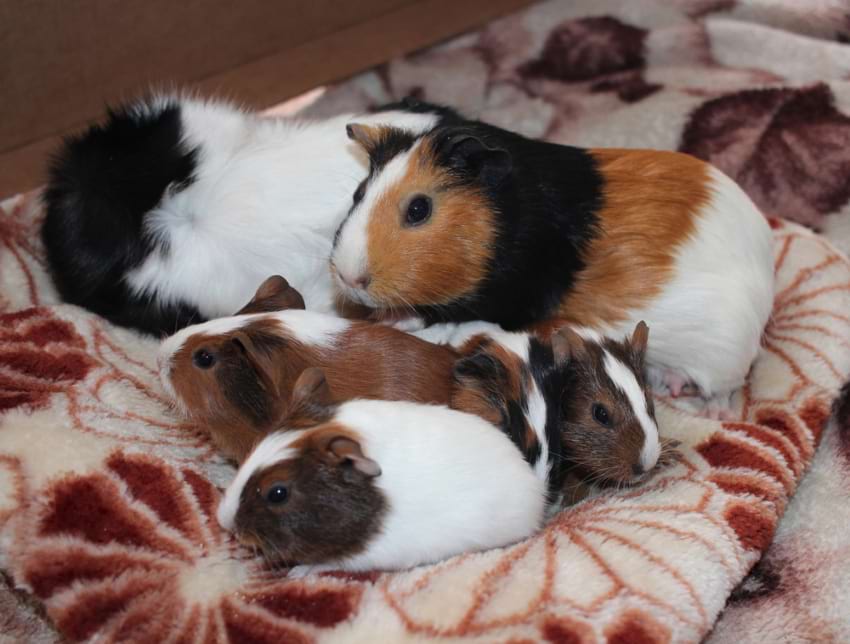
Mother guinea pigs typically do most of the work when it comes to raising their babies. All you should need to provide is food, water, vet care, and a clean, safe enclosure.
Talk to your veterinarian about how soon to bring your guinea pigs for their first appointment. A check-up soon after birth is important to ensure the health of the mama pig and her babies.
You’ll also want to weigh the babies regularly. While weights can vary, the important thing is that they continue to grow. If the babies don’t continue to steadily gain weight, and especially if they lose weight, call your veterinarian immediately.
Healthy babies are warm to the touch, energetic, and have round bellies. If they’re cold, still, or have thin stomachs, you and your vet may need to step in to hand-raise them.
How to Raise Orphaned Guinea Pigs
If your baby guinea pigs’ mother isn’t caring for them for any reason, call your veterinarian for advice. You may need to step in and raise the babies yourself. This means keeping them warm, feeding them with a bottle or syringe, and stimulating them to use the bathroom.
Room temperature is good for baby guinea pigs. They’ll also cuddle with each other to stay warmer and will enjoy cozy fleece items. You can provide a hot water bottle too, as long as they have space to get away from the heat if needed. Heat lamps and plug-in heating pads can be dangerous as they may get too hot and are also fire hazards.
When it comes to feeding, you’ll never want to force-feed your guinea pigs. Fill a bottle or syringe with formula made for baby guinea pigs–not cow’s milk or human baby formula. Some vets recommend using Critical Care rather than milk, so consult with your veterinarian to get the best advice for your situation.
Keep your baby guinea pig upright with all four paws on the floor. Let them latch onto the bottle or syringe and drip it into their mouths very slowly. This prevents them from inhaling or choking on the milk or Critical Care. Feed them 4-6 times daily.
Lastly, baby guinea pigs cannot potty on their own. Their mother helps them by licking their privates, which stimulates them to go. You can replicate this by rubbing a damp cotton pad around the genitals for around 15-20 seconds or until they pee and poop.
Setting Up a Cage for Baby Guinea Pigs
Baby guinea pigs don’t need many special accommodations aside from diet and a lowered water bottle, as we discussed above. You may want to expand the cage to make room for the new additions or add more tunnels, hides, and other enrichment items. Cozy items are also good for keeping babies warm during their first weeks of life.
Other piggy housemates don’t need to be removed from the cage but watch them to ensure they get along with the babies. Some adults will try to bully babies and if you see this behavior, you’ll need to separate them until the babies are rehomed or rebond them when they’re older.
Remove all unneutered adult males from the cage immediately to prevent them from hurting pregnant mamas or causing further pregnancies.
Baby Guinea Pig Milestones
Guinea pigs are born able to run around and can eat solids just a couple of days after they’re born. They’re not completely self-sufficient, but can do more for themselves than human babies or even puppies!
Weaning
Baby piggies will rely on their mother for milk until they’re weaned at around three to four weeks old. During this time, they’ll also eat solid foods like hay, vegetables, and pellets.
Separating From Mama Piggy

At three weeks old, you’ll need to sex your guinea pig’s babies and remove all males from the cage. They may seem too little, but they can already impregnate their mother and sisters at this age!
If you’re not confident in sexing baby guinea pigs, ask a veterinarian or other guinea pig professional for help. After all, you don’t want any more accidental litters!
You can place the males together in a separate cage or put single males with their father so that they can keep each other company. Please keep in mind that bonds with three or more males rarely work out long-term, though they’ll likely be okay until they get older.
Another option for long-term housing is to neuter the father or one of the males and house them individually with one or more females.
Baby guinea pigs can be adopted into their forever homes at around eight weeks old.
Handling and Socialization

Aside from quickly weighing and looking them over, you should handle baby guinea pigs minimally for the first two to three weeks. After three weeks, they can spend small amounts of time away from mom and littermates, and begin to bond with their human caretakers.
At this age, you only want to handle them briefly a few times a day. Wash your hands first to avoid spreading germs, as guinea pigs at this age are fragile.
Approach them from the side (not from the top!) and lift gently, supporting their entire body with your hands.
You can hold them in your lap for a few minutes, pet their heads, and touch their feet to begin desensitizing them to nail trims. Begin to get longhaired piggies used to the brush as well.
The more you handle them after they turn three weeks, the more well-socialized they’ll be as adults. You can also sit near or inside of the cage, or bring mama and babies out for floor time and sit with them outside of the enclosure.
Talk to them gently and feed them small bits of vegetables. Let them approach you and get used to your presence. Avoid sudden movements and towering over them, as this can be startling.
Overall, caring for a litter of baby guinea pigs is pretty easy, especially if their mother does a good job at providing for them. You’ll likely need to monitor their health, clean their cage, and provide food and water. Don’t forget to socialize the babies to humans as they age and to separate males from females once they’re three weeks old!
